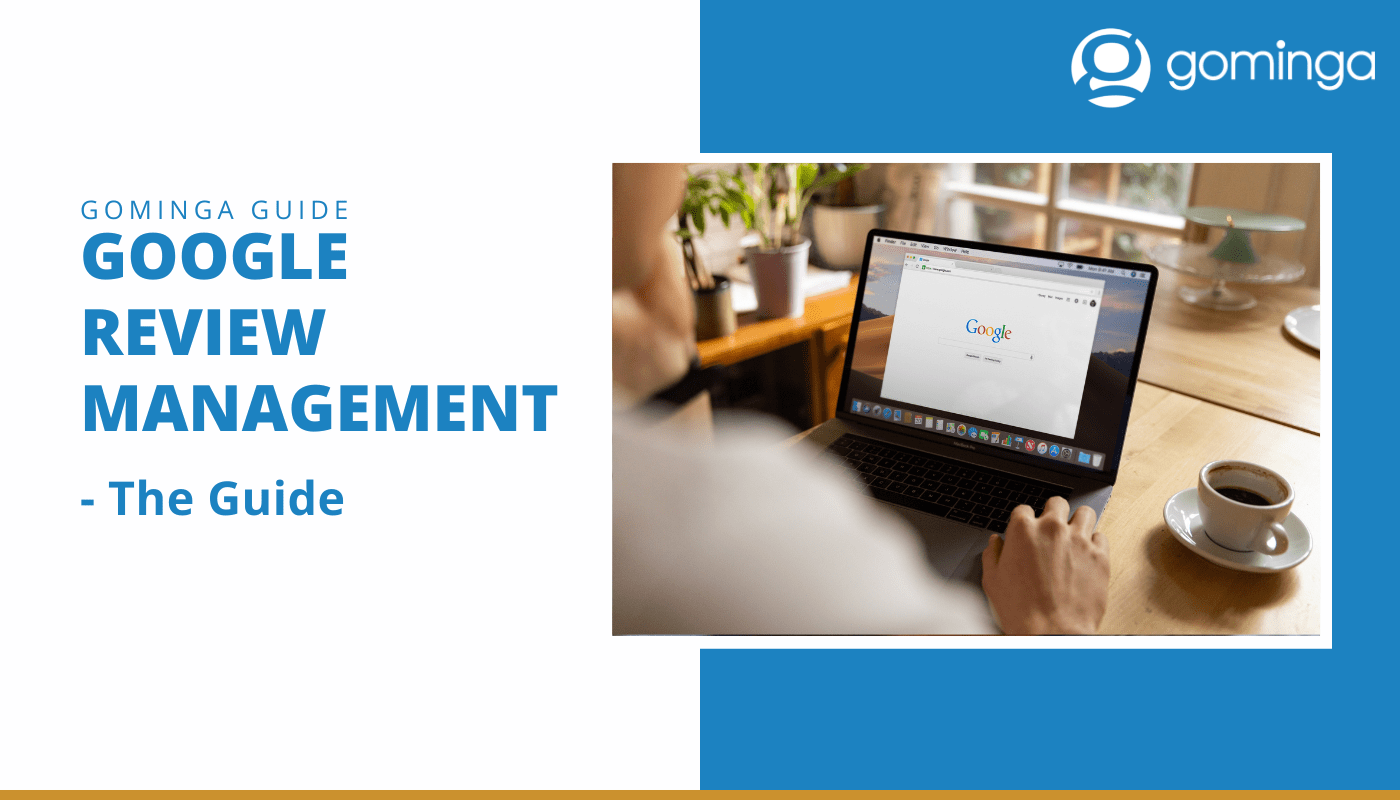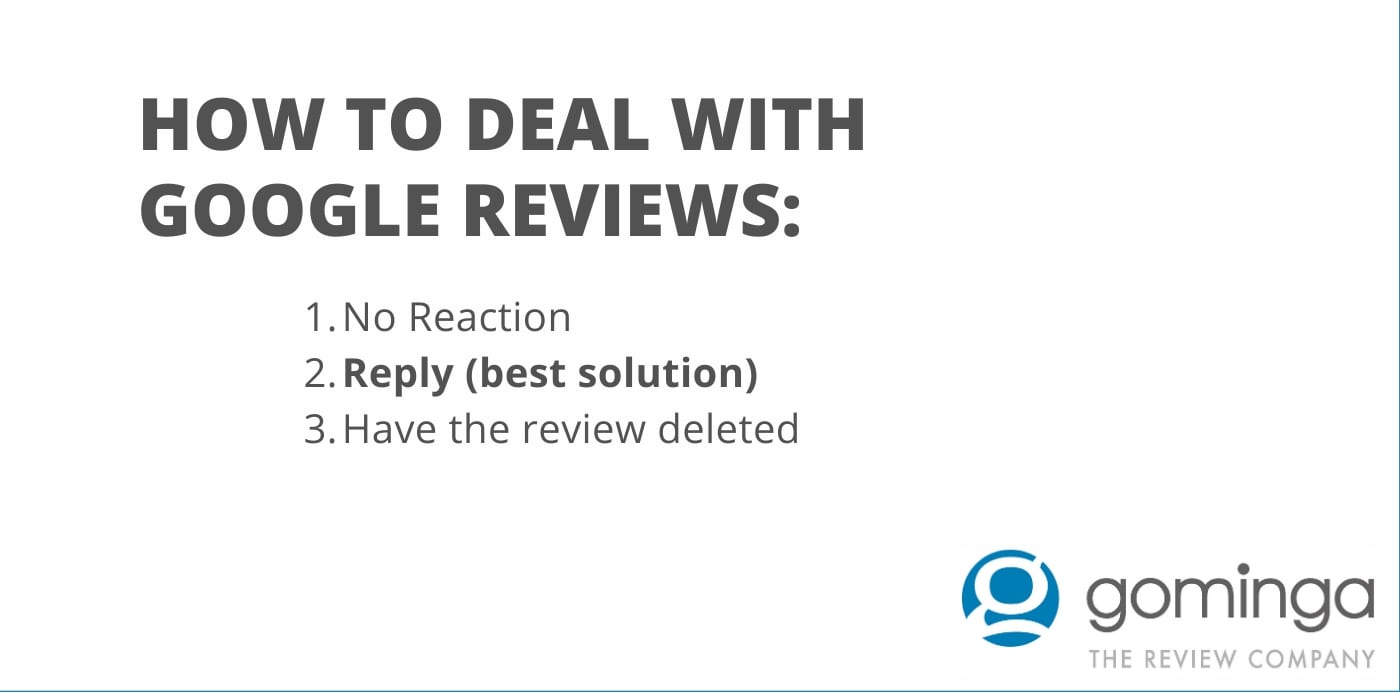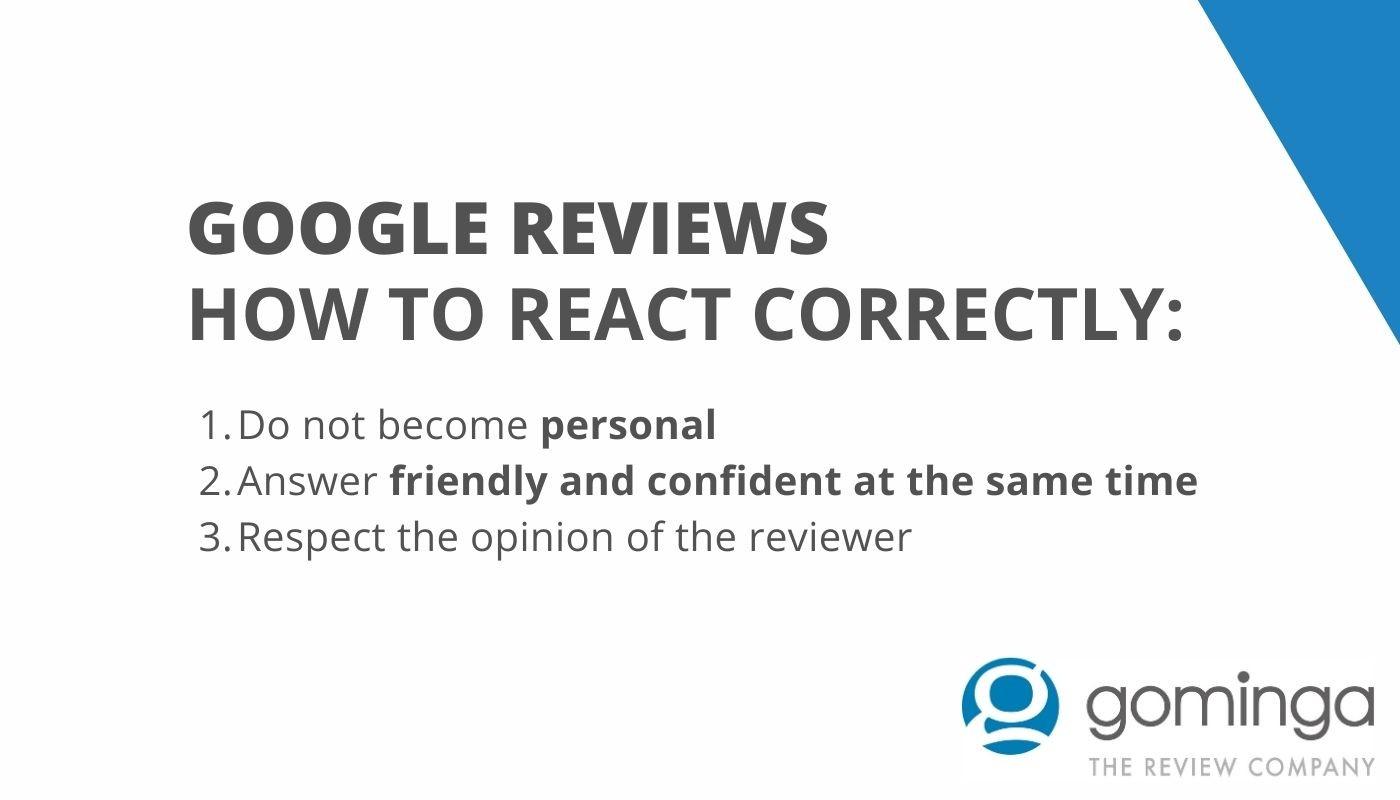
The importance of Google review management for companies is increasing, and the need to deal with professional review management comes with it. Every day, Google makes around 5.6 billion search queries, which is around 65,000 queries per second. This proves the importance of this search engine. Users Google directions and the products and experiences of retailers, manufacturers, services, restaurants, fitness studios, or hotels before they make a purchase decision.
A company that is not present on Google is hardly noticed. Those with the greatest chances are companies with a very good ranking and good Google reviews, which also positively influence the positions within the local search results. Google reviews play a crucial role in shaping a business’s online reputation and can significantly impact its visibility on Google search or Google Maps.
Therefore, there are enough reasons for companies to take care of the management of Google reviews actively. Responding to customer reviews, both positive and negative, shows that the business values feedback and is dedicated to improving its products and services. Google review management software and tools can help businesses effectively manage reviews for multiple locations, monitor new reviews, and respond to every review in a timely manner. By actively asking for reviews from satisfied customers and encouraging them to leave a review on Google, businesses can increase the number of reviews and improve their overall rating, ultimately attracting more customers and growing their success in the digital age.
Why is Google review management so important?
Users read the reviews on Google Business Profile, see the stars at a glance, and then decide: Do I go to this local business or restaurant, do I book this service, and is this salesperson reliable?
This decision is made in a second. Businesses with bad ratings have almost no more chances. Those rated very well are the favourites of all interested parties and climb up in the ranking through clicks on their website and also through the quality of the rating (a secret of Google algorithms). Google reviews can help a business improve its visibility and attract more customers, while negative Google reviews can have the opposite effect.
As a result, the company receives even more clicks and, in the case of truly outstanding performance, even more excellent reviews. However, there are more reasons why Google review management is so important. Google review management benefits businesses by helping them maintain a positive online reputation, leading to increased visibility, more customers, and greater success.
Positive Google reviews have an impact on local search results
Local search engine optimization (Local SEO) takes place in relation to the provider’s location. It is important for all locally active companies and service providers such as brand stores, hairdressers, doctors, craftsmen, restaurants, cinemas, supermarkets, etc.
In previous years, Local SEO was mainly done with landing pages in which the provider’s name, important keywords for its performance and the location appear, for example, “Autohaus Krause – Mercedes in Augsburg”. While this method still exists, more recent studies from 2017 to 2020 show that Google reviews provide significantly better results for local ranking. Managing your Google reviews and ensuring a high quantity and quality of reviews can greatly improve your business’s visibility in local search results.
Companies with good ratings rank higher in the local search, even if their backlink profile is weak. Several analyses of the factors that influence local SEO have shown that reviews correlate strongly with good local ranking. This means that companies with many good Google ratings rank very well on a local search, while links from external sites are not as important. To get more Google reviews, businesses can use review management software that helps manage reviews for multiple locations in one place, reply to reviews, and flag inappropriate reviews that violate Google’s review policies. By actively encouraging customers to leave reviews on their Google Business listing, businesses can improve their local search ranking and attract more customers. The benefits of Google review management include increased visibility, a better online reputation, and, ultimately, growth for the business.
Communication options on the review platform
Companies should respond to customer reviews on their Google Business listing if possible. This can lead to lively communication and improve the business’s ranking on Google search. Responding to reviews is a crucial aspect of the best Google review management practices and can help improve your business’s online reputation.
However, small businesses often lack the resources to respond comprehensively to every review, which is understandable. At a minimum, they should check their Google Business listing at least once a week to see if anyone has left new reviews. This can be made easier by using google review management software that helps manage reviews for multiple locations in one place and provides features such as review response templates and alerts for new reviews, such as gominga’s review manager.
Negative reviews, in particular, require an appropriate response. Other customers closely follow how a business handles criticism, and a well-crafted response can demonstrate the business’s commitment to customer satisfaction. How a company responds to negative reviews on Google Business can significantly impact its reputation and how potential customers perceive the business.
Analyze reviews and use them as feedback.
Analyzing the content and details of reviews provides valuable information and feedback that can help improve your business. By examining how customers rate various aspects of your business, such as staff, support, product range, prices, and cleanliness, you can identify areas for improvement and make necessary changes.
 Using Google’s review management software can help you efficiently manage reviews for multiple locations and gain insights into customer sentiment. These tools often include features that allow you to read and analyze customer reviews across various sites easily. Regularly monitoring and responding to reviews on your Google Business listing can demonstrate your commitment to customer satisfaction and enhance your online reputation.
Using Google’s review management software can help you efficiently manage reviews for multiple locations and gain insights into customer sentiment. These tools often include features that allow you to read and analyze customer reviews across various sites easily. Regularly monitoring and responding to reviews on your Google Business listing can demonstrate your commitment to customer satisfaction and enhance your online reputation.
The types of reviews your business receives can also provide valuable information. Positive reviews can highlight what your business is doing well, while negative reviews can shed light on areas that need improvement. By actively managing your reviews and using the insights they provide, you can make data-driven decisions to improve your business and better meet the needs of your customers. Ultimately, the effective use of review management platforms and the insights gained from analyzing reviews can help your business attract more customers and achieve long-term success.
The correct way to deal with Google reviews
Google reviews serve as a primary means of interaction with end customers, in addition to their expressiveness on the web, which is aimed at attracting new prospective customers and promoting ranking. The number of reviews a company receives can vary depending on factors such as the number of products they sell and the size of their customer base. While businesses that sell many different products to a large number of end consumers can expect more reviews, this is not always the case.
 Over time, we have become accustomed to certain products, and they may no longer generate a significant number of new Google reviews. However, when a business introduces new products, interest can be high, leading to an influx of reviews that can be positive, mixed, or negative. Responding to these reviews is crucial for businesses looking to manage their online reputation and engage with their customers.
Over time, we have become accustomed to certain products, and they may no longer generate a significant number of new Google reviews. However, when a business introduces new products, interest can be high, leading to an influx of reviews that can be positive, mixed, or negative. Responding to these reviews is crucial for businesses looking to manage their online reputation and engage with their customers.
When responding to reviews, it’s essential to keep a few key points in mind. Always maintain a professional and factual tone, avoiding personal attacks or defensive language. Respond kindly and confidently, showing respect for the reviewer’s opinion, even if it differs from your own. If a reviewer offers constructive criticism, take it seriously and consider how you can use their feedback to improve your business. In cases of unfair or irrelevant reviews, it’s best to provide a brief, professional response that addresses the concerns raised without engaging in a prolonged debate.
If a review is particularly serious, such as one that mentions a safety defect in your product, it’s important to ask the reviewer to contact you directly to resolve the issue. This demonstrates to other readers that you take customer concerns seriously and are committed to finding a solution. When responding to negative reviews, avoid offering compensation or discounts, as this can lead to a flood of demands from other customers. Instead, focus on addressing the specific concerns raised in the review and finding a satisfactory resolution for the customer.
By using Google review management software, businesses can streamline the process of monitoring and responding to reviews across multiple locations. These tools often provide features such as review templating and automated alerts, making it easier to stay on top of new reviews and respond in a timely manner. Additionally, by regularly monitoring and analyzing the reviews your business receives, you can gain valuable insights into what your customers like and dislike about your products or services, helping you make data-driven decisions to improve your offerings and better meet customer needs.
Ultimately, the way you handle Google reviews can have a significant impact on your business’s online reputation and success. By actively managing your reviews, responding professionally to both positive and negative feedback, and using the insights gained to continuously improve your products and services, you can build a strong, positive presence on Google and attract more customers to your business.
Google review management: how can you delete a Google rating?
As already mentioned, this would have to go against Google’s guidelines. These guidelines are strictly defined. So simply removing a review from the web doesn’t work – even if this review is unspecific and additionally very emotionally colored (“… didn’t like it at all – MEGA BAD!”). Such a review is annoying, the associated bad star rating drags down the overall result, but you must endure that.
In this case, trust the common sense of readers who, like you, are wondering: What does this person want? What did he not like? You can only have those bad reviews deleted that are:
- demonstrably originate from the competition and are therefore a form of unfair competition and/or
- constitute a form of spam and/or
- violate laws because they contain manifestly incorrect, defamatory, sexual, criminal, or offensive statements.
If you want to report this review to Google, you need to log into your My Business account and go to the administration view of “Reviews”. Now click on the three small vertical dots at the top right. A menu will appear with the sub-item “report as inappropriate”.
Report the entry and give reasons why you think it is inappropriate. Perhaps the reviewer is a former employee of yours who wants to defame you. You should be able to prove this. Afterwards, patience is required, the deletion can take several weeks.
If Google does not comply with your request, you can take legal action. Such lawsuits have already been successful, but for this you must be very sure of your case. You also need a good lawyer. As you see, Google Review Management is much more than simply reacting on reviews.
More about Google review management: analysis
Reviews, including negative ones, are considered valuable for businesses as they can serve as a cost-effective market research tool. By analyzing reviews for your business, you can gain insights into customer preferences and needs without conducting expensive focus groups or interviews, which may sometimes deliver distorted results due to participants receiving the product for free.
When customers write reviews after purchasing a product or visiting a restaurant, they provide honest opinions that can help businesses identify areas for improvement. Google reviews and reviews on other platforms can offer a wealth of information for businesses looking to enhance their products or services.
Recent research approaches utilize artificial intelligence to extract accurate customer feedback from Google ratings and reviews across various platforms. Companies like AMS (Applied Marketing Science) are working on developing these tools to help businesses better understand their customers’ needs and preferences. By leveraging AI-powered review analysis, businesses can uncover latent customer needs that may have been previously overlooked by product developers.
Ultimately, by treating reviews as a valuable source of market research, businesses can gain a competitive edge and improve their offerings to better meet the needs of their target audience. Investing in review management software and dedicating resources to analyzing customer feedback can help businesses stay ahead of the curve and make data-driven decisions to drive growth and success.
How do you integrate Google reviews into your marketing strategy?
Google reviews have become an essential tool for marketing departments, and businesses must take steps to leverage their potential. To maximize the impact of Google reviews, ensure that your Google My Business listing is complete, well-maintained, and compliant with Google’s policies.
In addition to your Google My Business listing, pay attention to all SEO factors on your website. Local SEO through your business entry will only be effective if your homepage or online store is well-optimized, including local references to your location.
Be responsive to customer reviews, particularly critical ones, following the guidelines mentioned earlier. Analyze your Google reviews to identify areas for improvement in your offerings. Addressing these issues is the best way to get more positive reviews in the future.
Write a follow-up email to your customers after a purchase, asking them to leave a review on Google. While satisfied customers may not always leave reviews, their feedback is crucial for your business’s online reputation.
Include positive Google reviews on your website, but ensure that you present a balanced picture. If you receive negative reviews, consider publishing them alongside your positive ones. You cannot use customer reviews to create a misleading positive image on your website that does not reflect the overall sentiment.
Google Review Management in a Conclusion
Google review management is a crucial aspect of online reputation management for businesses. With the increasing importance of Google Business Profile and the impact of reviews on local search rankings, businesses must actively manage their online reviews.
Positive reviews can boost a business’s visibility on Google Maps and Google Search, leading to increased traffic and potential customers. On the other hand, negative reviews can harm a business’s reputation and deter potential customers from engaging with the business.
To effectively manage Google reviews, businesses should regularly monitor and respond to reviews, both positive and negative, encourage satisfied customers to leave reviews, address negative reviews professionally and promptly, analyze reviews to identify areas for improvement in products or services and utilize review management tools to streamline the process.
Responding to reviews shows that the business values customer feedback and is willing to address concerns. When responding to negative reviews, business owners should remain professional, offer solutions, and take the conversation offline if necessary. It’s important to adhere to Google’s review policies to avoid violations that could result in the removal of reviews or penalties for the business listing.
Incorporating Google reviews into a business’s marketing strategy can help build trust and credibility with potential customers. Showcasing reviews on the business’s website and social media profiles can influence customer decisions and improve online reputation.
Investing in a Google review management service or software can help businesses efficiently monitor, respond to, and analyze reviews across multiple platforms. These tools often provide features such as review requests, centralized review management, and reporting to help businesses make data-driven decisions.
In conclusion, Google review management is an essential component of online reputation management for businesses of all sizes. By actively monitoring, responding to, and leveraging reviews, businesses can improve their online presence, attract more customers, and ultimately grow their success in the digital age.
We are more than happy to help you with your Google review management. Contact us now!
